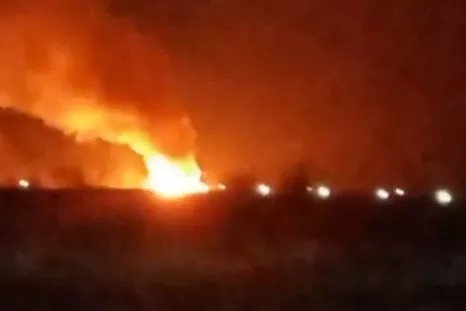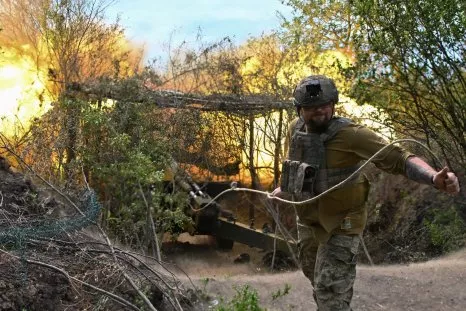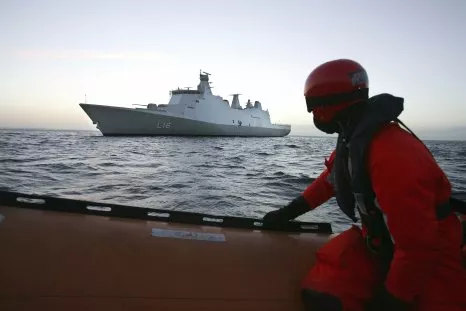Russian Black Sea Fleet's 'Logistical Problems' Explored
A Ukrainian Navy spokesperson this week suggested that the mauled Russian Black Sea Fleet is grappling with a range of "logistical problems" that are preventing Moscow from launching regular Kalibr cruise missile strikes.
The redeployment of advanced Russian Kalibr-capable vessels out of Crimea in recent weeks—following a spate of Ukrainian attacks on Russian ships and facilities in the Black Sea Fleet's home base of Sevastopol—Dmytro Pletenchuk claimed, means their access to the cruise missiles still stored in Sevastopol is now limited.
If accurate, the new challenge adds to a list of problems facing the Black Sea Fleet as the second winter of Moscow's full-scale war approaches. Since February 2022, the fleet has seen 17 vessels hit—most destroyed or damaged to the point of being taken out of action—including its sunk Moskva flagship and the new Askold corvette that was yet to enter service.
The Black Sea Fleet has lost a submarine, seen vital dry dock facilities in Sevastopol destroyed, and had its headquarters building in Crimea wrecked by Ukrainian cruise missiles. After that attack, satellite images showed Russian ships fleeing toward safer waters further east in the Black Sea, most notably the massive port of Novorossiysk.
Newsweek reached out to the Russian Defense Ministry via email for comment.
Being forced to abandon Sevastopol—the heart of Russian power projection in Crimea—is a humiliation for the Kremlin, an apparent admission of its inability to defend is fleet against an enemy with no conventional navy and limited air power. But Russia's Black Sea Fleet is wounded, not defeated.
Russia has maintained an intermittent blockade of Ukrainian ports that—twinned with a punishing missile and drone campaign—has severely undermined Kyiv's export economy. Though Ukraine has achieved much through its littoral asymmetric warfare campaign, Moscow still holds sway over much of the Black Sea, even if it might be forced to wield that power out of Novorossiysk rather than Sevastopol.
Still, the apparent relocation may complicate the fleet's difficult mission.
"They had considerable material in Sevastopol—particularly if they were repairing ships in dry dock—and it has to be moved," Sam Tangredi, the director of the U.S. Naval War College's Institute for Future Warfare Studies, told Newsweek.
"We don't know if Novorossiysk is designed to fit it all, or if, after the capture of 2014, the sense of urgency in getting it running efficiently was lost," he added. "Even for a NATO nation shifting ship repair and handling equipment would take time. Will it be so complicated as to have a strategic effect on the war? Unlikely. It would, however, symbolize that Crimea is not so secure."
A Tale of Two Ports
Andriy Ryzhenko, a retired Ukrainian naval captain and now a strategic expert at the defense and logistics consultant company Sonata, told Newsweek that the Russian fleet can expect "minor logistical challenges," though stressed that the Novorossiysk port is more than capable of housing Moscow's advanced, Kalibr-capable vessels.
"Novorossiysk is the biggest port in the European part of the country, and the biggest in the Black Sea," he said. "Its total tonnage per year is around 120 million. That's much more than the other ports. If you compare, it's four times the size of Odesa, and twice the size of Constanta" on Romania's Black Sea coast.
"Novorossiysk has all kinds of logistical facilities," Ryzhenko added. "For loading Kalibrs, you don't need very special equipment. You need the missiles, the special console for loading, and you need a crane."
"Fuel supplies and other supplies, I don't really see a problem," he added. "Maybe it's some kind of disinformation just for the media," Ryzhenko said of Pletenchuk's report. "Currently, with Novorossiysk, they don't have any logistic issues...It may be even better than any Crimea base, and safer also."
In everything but proximity to Ukrainian targets and political value, Novorossiysk appears a better bet.
"Prior to the invasion and capture of Crimea, [Russian President] Vladimir Putin intended to make Novorossiysk the Russian Black Fleet's primary home port," Tangredi said, adding that significant government investment there is believed to have begun in the early 2000s.
"I don't know what facilities have been built but given that presumably they have been continuing work on it—at least intermittently—for 20 years, one would think they made considerable progress," Tangredi said. "That's long enough to have constructed maritime logistics services (fuel, water, etc.) repair facilities, warehouses, Fleet headquarters, etc. All of that infrastructure would be newer than the infrastructure at the base in Sevastopol and be wired for digital services from the start."
Public commitments and declared spending by Russian officials does not always prove realistic.
"Given the corruption that seems endemic in Russia, it may be that Novorossiysk's infrastructure is not as good as Sevastopol," Tangredi said. "It is hard to tell actual quality—as opposed to layout—from satellite photos. Things can look more impressive and efficient than they are."
Ukraine has already attacked Novorossiysk with naval drones, but the eastern Black Sea port is still safer than Crimean harbors. Ukraine knows the layout of Sevastopol in intimate detail, having once owned the naval facilities there and until 2014 having control of the entire surrounding area.
"To destroy a fixed location, one does not need extensive radar or satellite targeting; one simply adjusts a ballistic missile's rocket-motor burn time to correspond to the distance and grid coordinates," Tangredi said. "Cruise missiles can be programmed to follow the known terrain."
"Presumably, by pulling fleet units out of Sevastopol to Novorossiysk, it will be harder for Ukraine to target them," Tangredi added. "I suspect that Russia had used Sevastopol for its fleet following the capture of Crimea because it was more convenient, and they did not anticipate ever facing Ukranian attacks. Also using it was a symbol that Crimea was always Russian."
Ukrainian drones trying to attack Novorossiysk face a longer journey, making them more prone to failure and vulnerable to interception.
"There is tyranny in distance," Tangredi said.
The Kalibr Question
The Black Sea Fleet's war record has been mixed, at best. Still, Russian warships have continued to inflict terror and damage on Ukrainian cities via Kalibr cruise missile strikes, though Ukrainian air defense units have become more and more adept at intercepting them, especially since the arrival of Western anti-air systems.
Russia is expected to try and freeze Kyiv into submission again this winter, which it failed to do last year. Moscow has reportedly amassed hundreds of missiles in preparation for its winter blitz, of which Kalibrs fired from Black Sea and Caspian Sea ships will form a significant part.
The Kalibr question involved in switching from Sevastopol to Novorossiysk may prove pressing for the Kremlin. The current lack of cruise missile strikes, Ryzhenko said, could be down to delays in moving Russia's Kalibr arsenal from Sevastopol to Novorossiysk.
"Maybe it's risky for them," he said, "they may be afraid to send ships because they can be attacked in Sevastopol Bay."
Pavel Luzin, a Russian political analyst and visiting scholar at the Fletcher School of Law and Diplomacy, told Newsweek that Russia now faces "two major problems."
"Russia has fired more than 760 Kalibr missiles since February 2022, and this amount cannot be replaced any time soon," Luzin said. "The Russian Navy does not have too many Kalibrs now."
Moscow has reportedly been expanding its missile production beyond its prewar capabilities, as Putin forces the national economy on to war footing and doubles down on his military gambit. Some reports have suggested that newly produced missiles might be less sophisticated given Russian no longer has access to certain key Western components.
"These statements are not based on verified data," Luzin said. "The bottleneck is not electronics; the bottleneck is engines."
Strike missions, too, will be complicated, Luzin said:
"The distance is also a problem; missile trajectory from Novorossiysk is different and longer. So, using Kalibrs from the eastern part of the Black Sea is a more sophisticated and less efficient task rather than using them from the western part of the sea."
Russia's Kalibr use has certainly terrorized Ukrainian cities and eroded critical infrastructure, though as yet have not been pivotal. "Deadly, yes; tactically useful, yes, but many of the strikes could have been made by Russian land-based systems," Tangredi said. "They use ship- and sub-launched Kalibr because they are already in the inventory, and it is easier to attack Odesa by sea."
"Also, they are technologically impressive and helps make the Russian leadership feel like they are leading a great power. Great powers have powerful navies, don't they? The U.S. Navy has used Tomahawk to great effect, should not Russia demonstrate similar capabilities to ensure that NATO nations and others know it?"
"It is kind of the equivalent of using the U.S. Navy to bombard Mexico," Tangredi added. "I'm being a bit facetious, but the Kalibr would only have strategic effect if Russia had thousands and could routinely use them in great numbers. What has more of a strategic effect is Russian control over the sea lanes that can block Ukraine's shipment of grain, etc. I don't see how the shift to Novorossiysk will change that."
"The main mission of the Russian navy in the war is control Ukraine's access and use of the Black Sea," Tangredi said. "Kalibr strikes are secondary."
"Will Russia continue occasional Kalibr strikes against Ukraine when the opportunities present themselves—whether the fleet is operating from Novorossiysk or Sevastopol? Certainly. But those attacks are the least of Ukraine's worries in comparison to the challenge of breaching Russian land defenses in the east."
Disclaimer: The copyright of this article belongs to the original author. Reposting this article is solely for the purpose of information dissemination and does not constitute any investment advice. If there is any infringement, please contact us immediately. We will make corrections or deletions as necessary. Thank you.





